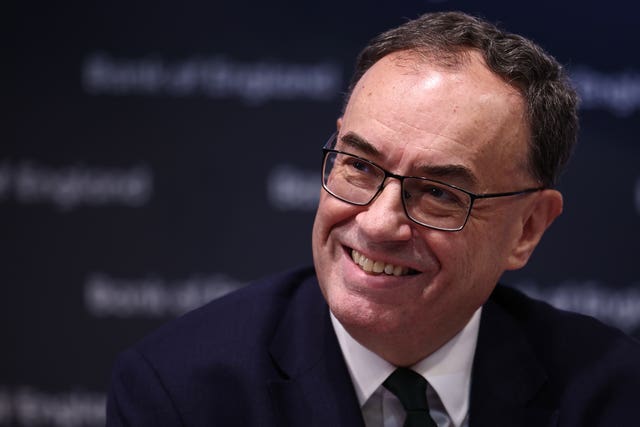
The Bank of England has cautioned over a “gradual approach” to cutting interest rates, as it forecast tax rises in the Budget could push inflation higher than previously thought.
The Bank’s Monetary Policy Committee (MPC) announced that rates were being reduced from 5% to 4.75% on Thursday.
UK inflation falling below the Bank’s 2% target meant it was possible to cut borrowing costs for the second time this year, the MPC said.
Governor Andrew Bailey said it cannot “cut interest rates too quickly or by too much” in order to ensure inflation stays close to the target level.
“But if the economy evolves as we expect, it’s likely that interest rates will continue to fall gradually from here,” he said.
Chancellor Rachel Reeves said it was “welcome news that interest rates are now on a downward path” and would continue to “gradually come down”.
But the future path for rates has been made more uncertain after the autumn Budget presented by Ms Reeves last week, which involved £40 billion worth of tax rises in a bid to boost public spending.
Mr Bailey said a “gradual approach” to reducing interest rates will “help us to observe” how the tax measures would play out for the economy.

Forecasting from the MPC showed that the Budget is expected to increase consumer prices index (CPI) inflation by just under 0.5 percentage points by late 2026.
It means inflation will now reach the Bank’s 2% target in the second quarter of 2027, about a year later than it previously projected.
There is “significant uncertainty” over the outlook for the jobs market, with businesses facing a bigger national insurance tax bill and a higher national minimum wage from April, the MPC said.
The impact on inflation would also depend on how far costs are passed through to prices, wages and employment, or absorbed into profits.
If businesses choose to raise their prices for consumers, this could put pressure on inflation, according to the MPC’s analysis.
Furthermore, the Budget is expected to boost economic growth by 0.75 percentage points at its peak in a year’s time, relative to previous forecasts published in August.
James Smith, a developed markets economist for ING, said it “now looks unlikely” that there will be another interest rate cut when the MPC next meets in December.
“Previously we’d thought that the Bank would accelerate its cutting cycle beyond today, but uncertainty surrounding the Budget’s impact has changed our mind on that,” he said.
“But the overarching message from the Bank today is that while the Budget will have some impact, it is just one of a number of factors affecting the inflation outlook right now.”
Sandra Horsfield, an economist for Investec, agreed that the new inflation forecasts “would seem, on the surface, to warrant fewer and later rate cuts in the future”, but that the MPC’s outlook has not “fundamentally changed”.
Meanwhile, Mr Bailey shrugged off potential concerns over the global impact of a Donald Trump presidency in the US, saying it was “not useful or wise to enter into speculation” about what policies might be introduced.
It comes after some economists suggested that Mr Trump’s plans to raise tariffs on imports into the US could put pressure on UK goods prices.
“I’m not going to make any presumptions about what will happen, I’m sure there will be a very open dialogue between us and the US administration,” he said.


Why are you making commenting on The National only available to subscribers?
We know there are thousands of National readers who want to debate, argue and go back and forth in the comments section of our stories. We’ve got the most informed readers in Scotland, asking each other the big questions about the future of our country.
Unfortunately, though, these important debates are being spoiled by a vocal minority of trolls who aren’t really interested in the issues, try to derail the conversations, register under fake names, and post vile abuse.
So that’s why we’ve decided to make the ability to comment only available to our paying subscribers. That way, all the trolls who post abuse on our website will have to pay if they want to join the debate – and risk a permanent ban from the account that they subscribe with.
The conversation will go back to what it should be about – people who care passionately about the issues, but disagree constructively on what we should do about them. Let’s get that debate started!
Callum Baird, Editor of The National
Comments: Our rules
We want our comments to be a lively and valuable part of our community - a place where readers can debate and engage with the most important local issues. The ability to comment on our stories is a privilege, not a right, however, and that privilege may be withdrawn if it is abused or misused.
Please report any comments that break our rules.
Read the rules hereLast Updated:
Report this comment Cancel